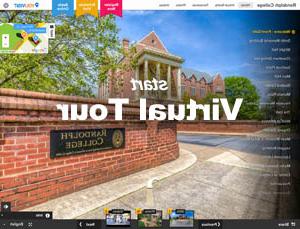Financial Aid
Federal CARES Act Student Emergency Aid Funds at Randolph
Updates
- Randolph College’s CARES Act HEERF Emergency Student Grants Report – February 8, 2021
- Randolph College’s CARES Act HEERF Institutional Portion Report – October 21, 2020
- Randolph College’s CARES Act HEERF Emergency Student Grants Report – October 9, 2020
- Randolph College’s CARES Act HEERF Emergency Student Grants Report – July 29, 2020
- Randolph College’s CARES Act HEERF Emergency Student Grants Report – June 15, 2020
Overview
As a result of Congress passing the Coronavirus Aid, Relief, and Economic Security (CARES) Act, Randolph has been allocated $332,437 in emergency student aid to assist eligible students who incurred “expenses related to the disruption of campus operations due to coronavirus, such as food, housing, course materials, technology, health care, and child care expenses.”
Once the CARES Act was passed into law, it fell to the Department of Education (ED) to provide guidance to higher education institutions regarding implementation of the provisions. Guidance from ED was key in determining how the funds would be distributed to our students. The key components of this guidance that played a factor in our decision are the following:
- Funds can only be awarded to students for “expenses related to the disruption of campus operations due to coronavirus, such as food, housing, course materials, technology, health care, and child care expenses.”
- Students receiving these funds must meet the eligibility criteria in Section 484 of the Title IV Higher Education Act. This includes, but is not limited to, the demonstration of the following: be making satisfactory academic progress; not owe an overpayment on Title IV grants or loans; not be in default on a Title IV loan; file “as part of the original financial aid application process” a certification that includes statement of educational purpose and valid Social Security Number, be a U.S. citizen or national, permanent resident, or other eligible noncitizen; have returned fraudulently obtained Title IV funds if convicted of or pled guilty or no contest to charges; not have fraudulently received Title IV loans in excess of annual or aggregate limits; have repaid Title IV loan amounts in excess of annual or aggregate limits if obtained inadvertently; have Selective Service registration verified (if student is a male); not have a federal or state conviction for drug possession or sale, with certain time limitations. While this does not specify students must complete a Free Application for Federal Student Aid (FAFSA), the only way to determine if a student meets the Section 484 requirements is for a FAFSA to be filed.
Who Will Receive Funds?
As a result of this guidance, Randolph will be awarding the emergency financial aid funds from the CARES Act to Spring 2020 enrolled students who are in a degree program, have a 2019-20 FAFSA on file with Randolph, and meet the Section 484 criteria.
As with other institutions of higher education, 75% of Randolph’s CARES Act allocation was based on enrollment of Pell grant recipients, while the remaining 25% was based on total enrollment. Therefore, Randolph is allocating 75% of its CARES Act funding evenly to students who received Pell grants during the Spring 2020 semester, and the remaining 25% evenly to all other eligible students. This formula results in each Pell student receiving an award of $1,222, and each non-Pell student receiving an award of $291.
Timeframe and Process for Awarding
Upon Randolph’s receipt of a student’s CARES Act Distribution Form confirming that he/she has incurred “expenses related to the disruption of campus operations due to coronavirus, such as food, housing, course materials, technology, health care, and child care expenses,” a check will be mailed to the address provided in the form. Checks can take up to two weeks to process. Students who have not incurred such expenses should decline the award.
Frequently Asked Questions
As a result of Congress passing the Coronavirus Aid, Relief, and Economic Security (CARES) Act, Randolph has been allocated $332,437 in emergency student aid to assist eligible students who incurred “expenses related to the disruption of campus operations due to coronavirus, such as food, housing, course materials, technology, health care, and child care expenses.”
Students receiving these funds must meet the eligibility criteria is Section 484 of the Title IV Higher Education Act. This includes, but is not limited to, the demonstration of the following:
- Be enrolled or accepted for enrollment in a degree seeking program or certificate program. Program must be eligible for TIV aid consideration.
- Not be enrolled in elementary or secondary school and have a high school diploma or its recognized equivalent;
- Be maintaining satisfactory academic progress (SAP) if currently enrolled;
- Not owe an overpayment (refund) on Title IV grants;
- Not be in default on a Title IV loan;
- Be a U.S citizen or national, a permanent resident, or an eligible noncitizen;
- Returned any fraudulently obtained Title IV funds, due to the student being convicted of or pled guilty or no contest to such charges
- Not have fraudulently received Title IV loans in excess of annual or aggregate limits;
- Have repaid any Title IV loan overpayment amounts in excess of annual or aggregate limits, if obtained inadvertently;
- Male students must be registered with Selective Service;
- Have a valid SSN, except for residents of the Federated States of Micronesia, Republic of the Marshall Islands, or the Republic of Palau; and
- Not have a federal or state conviction for drug possession or sale, with certain time limitations.
While this does not specify students must complete a Free Application for Federal Student Aid (FAFSA), the only way to determine if a student meets the Section 484 requirements is for a FAFSA to be filed.
While the CARES Act does not specify students must complete a Free Application for Federal Student Aid (FAFSA), the only way to determine if a student meets the Section 484 requirements is for a FAFSA to be filed.
Randolph emailed students who had not filed a 2019-20 FAFSA to inform them that we would be distributing funds partly on need. This correspondence indicated that it was imperative that each student complete the 2019-20 FAFSA by Friday, May 22.
Additionally, it indicated that if we did not receive your 2019-20 FAFSA filing by May 22, we were not able to ascertain your Title IV eligibility and, therefore, the student would not be eligible to receive CARES Act funds.
CARES Act funds can be awarded to students for “expenses related to the disruption of campus operations due to coronavirus, such as food, housing, course materials, technology, health care, and child care expenses.”
This may include items such as rent, food, utilities, school related technology and/or supplies (e.g., internet, tutoring, computer issues, etc.), or healthcare needs (e.g., medication, counseling, etc.).
At times, an income change can lead to increased financial aid eligibility for a student. Other times, it does not. The only way to find out how an income change will impact your eligibility is to go through the Professional Judgment process in the Financial Aid Office. You can find information about that process in the Financial Aid Special Circumstances (Professional Judgment) section of our website. CARES Act funding cannot be awarded on the basis of an income reduction.
At this time, Randolph is scheduled to be open for the Fall 2020 term and return to normal operations. As a result, there would not be any qualifying campus disruptions due to COVID-19 to warrant our ability to award funds for that term.
Yes, students who had qualifying expenses during that term are still eligible to receive assistance.
Yes, to be considered for CARES Act funding, you must meet the minimum Satisfactory Academic Progress (SAP) standards as outlined in the Academic Catalog (pages 27-28, 50-51, 113).
While we cannot give you a specific timeframe on when you will receive your funds, we can say that the disbursements to you will be generated as quickly as possible. In general, checks can take up to two weeks to process from the time your CARES Act Distribution Form is received.
No, the funds will be refunded directly to you. Randolph is not allowed to apply these funds to any outstanding charges, even if student wishes to provide authorization to do so.
Other Resources for Information
DOE Frequently Asked Questions:
http://www2.ed.gov/about/offices/list/ope/heerfstudentfaqs.pdf
IRS FAQ information:
http://www.irs.gov/newsroom/faqs-higher-education-emergency-relief-fund-and-emergency-financial-aid-grants-under-the-cares-act
NASFAA COVID-19 Reference Page:
http://www.nasfaa.org/covid19_heerf



